I am a firm believer that a piping hot bowl of properly seasoned and spiced pho can cure anything from a hangover to the common cold. Five years ago, Pho Hoa was the only spot I could get my fix. Then Savoy opened up, and now Cyclo, and the first time I walked up Yanji Street (延吉街) towards the Vietnamese-style restaurant, I knew the pho was going to be good because the air was thick with the pungent aroma of pho broth.
If you’re a pho novice, here is the rundown. A heady broth is simmered for hours with beef bones, cinnamon, ginger, charred cloves and star anise. It is then poured into a bowl overtop raw meat and rice noodles, which retain the right consistency of firmness, and then brought to your table. The broth is so hot, it cooks the meat in the bowl. After it arrives, you season it further with fresh herbs, lemon, hot peppers and Sriracha, a hot sauce.
Cyclo calls itself an American-style Vietnamese restaurant, but I’ve had pho in America as well as at roadside stalls in Vietnam, and what it offers tastes as close to the real thing as you can imagine. The quality of pho is measured by its broth, and no two soups ever taste the same.
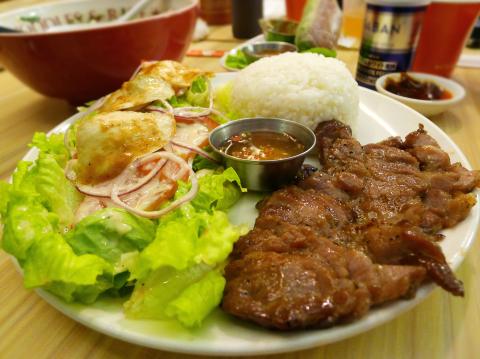
Photo: Olivia Wycech
Cyclo is small and furnished with simple tables and stools. The walls are adorned with images that depict the restaurant’s mascot, a cow that comically sports a necklace. The kitchen is open concept, so if you’re sitting near the back you can see how the broth is made and how the pho is assembled. The servers seemed hesitant to speak English, slowing down the service somewhat and the menu, which attempts to be bilingual, is also missing a lot of information. That being said, I’ve never had to wait longer than 10 minutes for a table, even though the place is always busy.
For an appetizer, I ordered the golden triangle (NT$25 for one), deep fried phyllo pastry stuffed with sour cream, chicken curry, or creamed spinach. These are somewhat small, but the one or two bites are satisfying. I suggest ordering one of each. The spring rolls (NT$45 for one) are deep-fried and crunchy, and come with fish sauce, exactly as they are served in northern Vietnam. Cyclo does offer healthier options, which includes a variety of summer rolls (NT$65 to NT$190) that are stuffed with anything from seafood to Spam, and come with a side of thick peanut sauce.
For first timers, ordering pho can be confusing because there are so many options. The Cyclo special (NT$290) is a medley of sirloin beef, brisket, brisket point, beef balls, flank, tripe and tendon. You can also create your own pho (NT$230) and choose any three of the above toppings. There is also the option of building your own pho with three toppings of sirloin beef. You can add extra beef to any soup (NT$50 to NT$160).
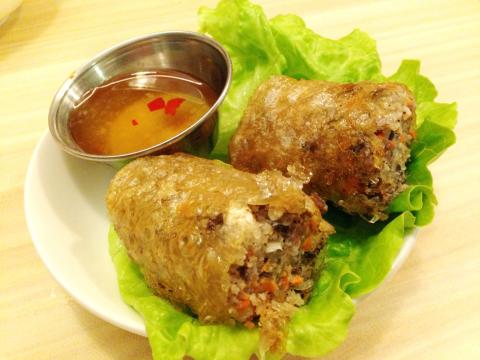
Photo: Olivia Wycech
For those watching their waistline, broth can be ordered either full or half fat, but if you want a broth rich with dimension and flavor, go with full fat. The menu also offers add-ons like bean sprouts, onions and herbs (NT$20 to NT$40). You can also choose between rice starch, rice flour lath or thin egg noodles.
The drink menu features cans (NT$60) of Dr. Pepper, A&W Root Beer, Mountain Dew and Cherry Coke, all of which can be made into a float with a scoop of ice cream (NT$30). Vietnamese coffee (NT$95) is always a good choice, as is the honey and lemon tea (NT$75).
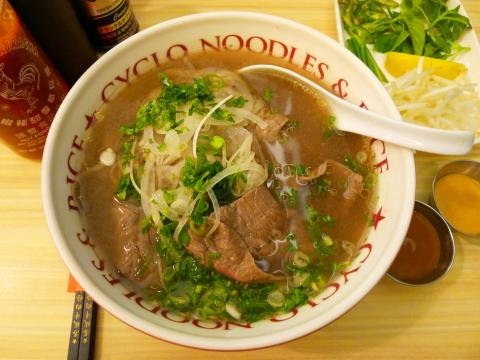
Photo: Olivia Wycech
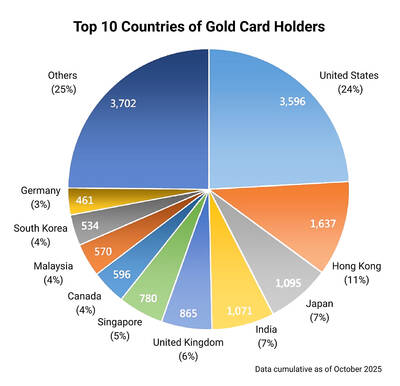
Seven hundred job applications. One interview. Marco Mascaro arrived in Taiwan last year with a PhD in engineering physics and years of experience at a European research center. He thought his Gold Card would guarantee him a foothold in Taiwan’s job market. “It’s marketed as if Taiwan really needs you,” the 33-year-old Italian says. “The reality is that companies here don’t really need us.” The Employment Gold Card was designed to fix Taiwan’s labor shortage by offering foreign professionals a combined resident visa and open work permit valid for three years. But for many, like Mascaro, the welcome mat ends at the door. A

If China attacks, will Taiwanese be willing to fight? Analysts of certain types obsess over questions like this, especially military analysts and those with an ax to grind as to whether Taiwan is worth defending, or should be cut loose to appease Beijing. Fellow columnist Michael Turton in “Notes from Central Taiwan: Willing to fight for the homeland” (Nov. 6, page 12) provides a superb analysis of this topic, how it is used and manipulated to political ends and what the underlying data shows. The problem is that most analysis is centered around polling data, which as Turton observes, “many of these
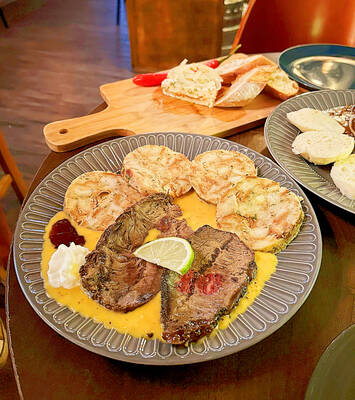
Divadlo feels like your warm neighborhood slice of home — even if you’ve only ever spent a few days in Prague, like myself. A projector is screening retro animations by Czech director Karel Zeman, the shelves are lined with books and vinyl, and the owner will sit with you to share stories over a glass of pear brandy. The food is also fantastic, not just a new cultural experience but filled with nostalgia, recipes from home and laden with soul-warming carbs, perfect as the weather turns chilly. A Prague native, Kaio Picha has been in Taipei for 13 years and
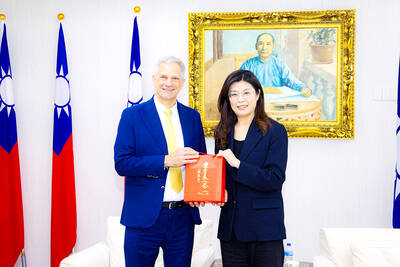
Since Cheng Li-wun (鄭麗文) was elected Chinese Nationalist Party (KMT) chair on Oct. 18, she has become a polarizing figure. Her supporters see her as a firebrand critic of the ruling Democratic Progressive Party (DPP), while others, including some in her own party, have charged that she is Chinese President Xi Jinping’s (習近平) preferred candidate and that her election was possibly supported by the Chinese Communist Party’s (CPP) unit for political warfare and international influence, the “united front.” Indeed, Xi quickly congratulated Cheng upon her election. The 55-year-old former lawmaker and ex-talk show host, who was sworn in on Nov.